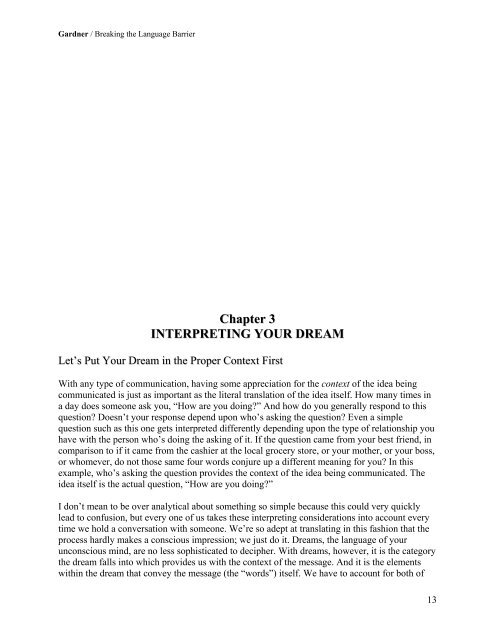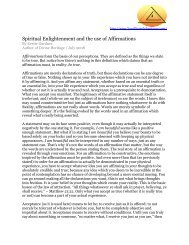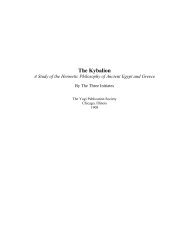Breaking the Language Barrier: Learning to Interpret Your Dreams
Breaking the Language Barrier: Learning to Interpret Your Dreams
Breaking the Language Barrier: Learning to Interpret Your Dreams
You also want an ePaper? Increase the reach of your titles
YUMPU automatically turns print PDFs into web optimized ePapers that Google loves.
Gardner / <strong>Breaking</strong> <strong>the</strong> <strong>Language</strong> <strong>Barrier</strong><br />
Chapter 3<br />
INTERPRETING YOUR DREAM<br />
Let’s Put <strong>Your</strong> Dream in <strong>the</strong> Proper Context First<br />
With any type of communication, having some appreciation for <strong>the</strong> context of <strong>the</strong> idea being<br />
communicated is just as important as <strong>the</strong> literal translation of <strong>the</strong> idea itself. How many times in<br />
a day does someone ask you, “How are you doing” And how do you generally respond <strong>to</strong> this<br />
question Doesn’t your response depend upon who’s asking <strong>the</strong> question Even a simple<br />
question such as this one gets interpreted differently depending upon <strong>the</strong> type of relationship you<br />
have with <strong>the</strong> person who’s doing <strong>the</strong> asking of it. If <strong>the</strong> question came from your best friend, in<br />
comparison <strong>to</strong> if it came from <strong>the</strong> cashier at <strong>the</strong> local grocery s<strong>to</strong>re, or your mo<strong>the</strong>r, or your boss,<br />
or whomever, do not those same four words conjure up a different meaning for you In this<br />
example, who’s asking <strong>the</strong> question provides <strong>the</strong> context of <strong>the</strong> idea being communicated. The<br />
idea itself is <strong>the</strong> actual question, “How are you doing”<br />
I don’t mean <strong>to</strong> be over analytical about something so simple because this could very quickly<br />
lead <strong>to</strong> confusion, but every one of us takes <strong>the</strong>se interpreting considerations in<strong>to</strong> account every<br />
time we hold a conversation with someone. We’re so adept at translating in this fashion that <strong>the</strong><br />
process hardly makes a conscious impression; we just do it. <strong>Dreams</strong>, <strong>the</strong> language of your<br />
unconscious mind, are no less sophisticated <strong>to</strong> decipher. With dreams, however, it is <strong>the</strong> category<br />
<strong>the</strong> dream falls in<strong>to</strong> which provides us with <strong>the</strong> context of <strong>the</strong> message. And it is <strong>the</strong> elements<br />
within <strong>the</strong> dream that convey <strong>the</strong> message (<strong>the</strong> “words”) itself. We have <strong>to</strong> account for both of<br />
13






